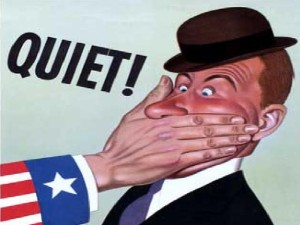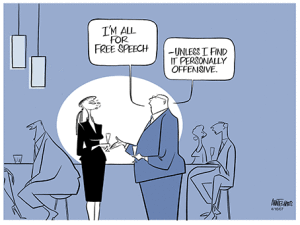Retired Police Officer Arrested for Sharing Gospel in NJ Mall
Daily News Article — Posted on November 15, 2013
 (by Rob Spahr, NJ.com) EATONTOWN – A retired Long Branch (New Jersey) police officer was charged with trespassing last week after promoting his faith to shoppers at Monmouth Mall in New Jersey.
(by Rob Spahr, NJ.com) EATONTOWN – A retired Long Branch (New Jersey) police officer was charged with trespassing last week after promoting his faith to shoppers at Monmouth Mall in New Jersey.
According to the Christian News Network, David Wells, a former corporal with the Long Branch Police Department, was distributing religious materials to mall patrons “in hopes that it will cause them to ponder matters of eternity.”
“I simply approached individuals and asked them if I could ask them a question. If they said no, I left them alone,” Wells told the Christian News Network. “If they said yes I simply asked, ‘Are you going to Heaven?’ How I responded was based on how they answered that question.”
Wells said he had witnessed to mall patrons in the presence of mall security without an issue in the past, but that last Tuesday was different.
“The mall security came over and immediately told me to stop what I was doing and to leave the property,” he said. “They indicated that the mall was private property and [that I couldn’t distribute tracts there].”
However, citing a state court ruling that declared malls a quasi-public venue where such leaflets could be distributed, Wells argued that he had a right to do what he was doing, which prompted mall security to call the police.
[The New Jersey Supreme Court ruled in 1994 in the case of New Jersey Coalition Against War in the Middle East v. J.M.B. Realty Corporation that malls followed the “historical path of free speech,” in the vein of parks, squares and downtown business districts. It allowed citizens to distribute leaflets both inside and outside malls, but did not endorse other forms of expression such as public speeches.The justices also outlined that a complaint is not enough to force termination of the right to free expression. Wells stated that he was unaware of a complaint, but said that it might have been the instigator that eventually forced him out of the mall.
 “[S]ome people will not like it, any more perhaps than they liked free speech at the downtown business districts. Dislike for free speech, however, has never been the determinant of its protection or its benefit. We live with it, we permit it, as we have for more than two hundred years,” the court stated. “It is free speech, it is constitutionally protected; it is part of this State, and so are these centers.”]
“[S]ome people will not like it, any more perhaps than they liked free speech at the downtown business districts. Dislike for free speech, however, has never been the determinant of its protection or its benefit. We live with it, we permit it, as we have for more than two hundred years,” the court stated. “It is free speech, it is constitutionally protected; it is part of this State, and so are these centers.”]
When police arrived, Wells said, they instructed him to leave the mall or be arrested.
“I was polite about it,” Wells said. “I told them I didn’t want to get arrested. I wasn’t trying to make a scene, but I also wasn’t doing anything wrong.”
After continuing to assert that his activities were legal, Wells was arrested and charged with trespassing, which he reportedly pleaded not guilty to on Thursday.
“I want to emphasize that I was not making any public spectacle: no signs, no loudness, no offensive language. I was simply trying to talk to people,” Wells told the Christian News Network. “If we’ve gotten to the point in the U.S. that we cannot talk to other people civilly, we’re in trouble.”
Wells is scheduled to appear in court again on December 5, the report said.
Reprinted here for educational purposes only. May not be reproduced on other websites without permission from NJ.com.
Questions
1. Who is David Wells?
2. a) What was Mr. Wells doing at a mall in New Jersey last week?
b) Why was Mr. Wells doing this?
3. How was he doing it? (What did he want to emphasize about the way he went about talking to shoppers)?
4. Why was Mr. Wells arrested? (Explain the events leading to his arrest.)
5. Describe the ruling the NJ Supreme Court made in 1994 that set a precedent to protect citizens' right to free speech in malls.
6. Mr. Wells actions were within the law. He had also done the same thing on other occasions at the same mall. Why do you think this time mall security called the police, and the police arrested him?
